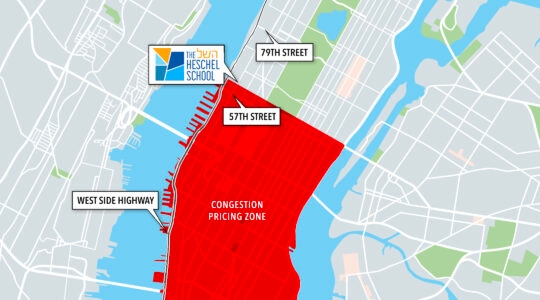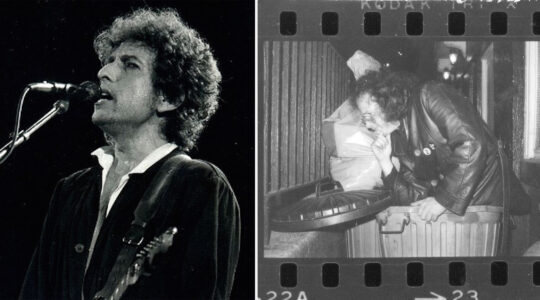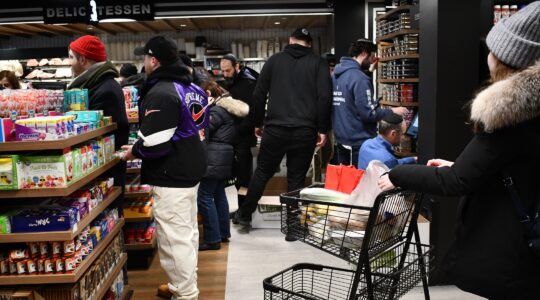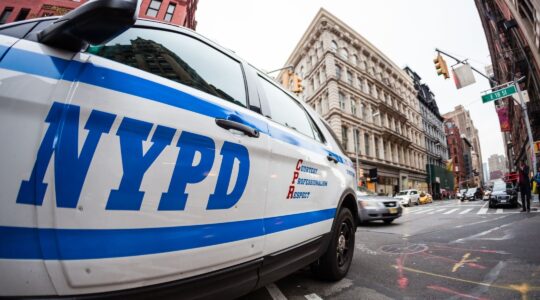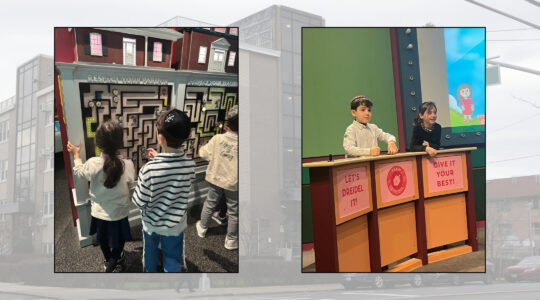When fate would bring him back to Liverpool, Sid Bernstein would go to the Kirkdale Jewish Cemetery, placing a pebble atop the black granite gravestone. Here lay Shmuel son of Tzvi, who died on 21 Menachem Av, 1967 — Shmuel, better known as Brian Epstein, manager of the Beatles, though there is no mention of the Beatles on his stone. That the Beatles came to America 50 years ago, an anniversary celebrated this week across the land, is because of a phone call Bernstein made to Epstein 51 years ago, in 1963, to book the Beatles one year later, Feb. 12, in Carnegie Hall—their first booking in America. A show in Washington, D.C., and the Ed Sullivan shows, were booked later, sandwiched around Sid Bernstein’s shows in Carnegie.
“I go to visit Brian,” Bernstein told us before he died in 2012, “To the shul where his funeral was, to visit his family, just to say, ‘Thank you, Brian, thank you. I’ll never forget you.’ He turned my life around.”
Epstein was slender, lonely, a closeted English homosexual at a time when that would have been scandalous for the Beatles, let alone a crime. Bernstein, married with six children, was a hearty “hail fellow, well met” from the East Bronx. But they were two Jewish guys in an uncertain world, and their Yiddishkeit mattered to each of them. Years later, Bernstein told me that in 1966, when Bernstein tried his hand at managing bands, including future Rock n’ Roll Hall of Famers the Rascals and Laura Nyro, he found himself one night at the Olympia Theater in Paris, where the Rascals were kicking off their first European tour. Epstein flew from London to Paris, to surprise Bernstein backstage, to wish him well. Epstein was once a new manager, too, bringing a band over the ocean, and Bernstein was there for him.
“Sid,” said Epstein, as he slung his arm around Bernstein’s shoulders, “What are two Jewish boys doing here, in a theater surrounded by four goyim [the Rascals] and all these French people?”
That Epstein, always physically cautious, could publically swing an arm around another man was indicative of how safe he felt with Bernstein. They were like two Jews doing deals in the Diamond District; everything was trust, never a written contract, not even for that first trip to America, not even when the financial stakes were big, such as booking the Beatles into Shea Stadium. “Brian gave me his word,” recalled Bernstein, “all I needed. That was the beauty of Brian Epstein. The most wonderful, decent, honorable man.”
Over the years, around other Beatles anniversaries, we’d sometimes visit Bernstein in his Manhattan home. “It’s easy to remember my apartment,” the spirited Bernstein would say: “9-H, for happy.” More than 40 years after his last call to Epstein before Epstein died of an overdose, Bernstein said it was as easy as 9-H to remember Epstein’s home phone in Liverpool: “Chilwall 6-518.”
The first time Bernstein called that number, Queenie, Brian’s mother, answered. Queenie’s real name was Malka (“queen” in Hebrew). Queenie was worried about how much the long-distance call from New York was costing Bernstein. Elliott Gordon, a friend of Bernstein’s, and a talent agent himself, tells us that in that first conversation between Bernstein and Queenie, she mentioned that she loved The New York Times Sunday Book Review section but rarely could see it. Bernstein mailed it to her later that week and every week for the rest of her life.
Bernstein understood the pleasure of an out-of-town newspaper in those pre-Internet days. It was how he discovered the Beatles.
He had some success as a promoter, but in 1963 he was close to broke. He had lost his shirt, $18,000 to be exact, promoting the 1961 Newport Jazz Festival.
He was in a jam. “I had to get away from the meshugas of the music business,” he told me, years later. So he signed up for a class about democracy at the New School, and part of the homework was to read the British papers, to see how that other democracy works. Bernstein was less interested in the parliamentary news than the entertainment news. He missed the meshugas after all. There were all these acts he never heard of. The Atlantic was much wider in those days. One day he sees a story, “about four or five lines,” he held his thumb and forefinger about an inch apart, “about four kids from Liverpool.”
The next week, maybe 10 lines. The week after that, a photo. Like all broke men at the racetrack, Bernstein still thought he could trust his hunch. He’d make the long-distance call. If only he had a number to call.
Bernstein’s friend Gordon says, “Remember Schrafft’s ice cream parlor? Sid knew and loved his ice cream. So he’s having ice cream in Schrafft’s and an agent, Bud Seligwell, walks in, ‘Sid, how ya doin’?’ Sid says, ‘I’m frustrated. I’m hot on a British band, kids named the Beatles, but I can’t find their representation.’ Bud says, ‘I just got back from England. I was working with a guy named Brian Epstein. But Sid, this is very local action. It’s not nearly as big as you think.’ Sid says, ‘Bud, I feel it in my bones.’”
Everything is “bashert,” fate, Bernstein would say. He gets Epstein’s number from Seligwell over ice cream, and calls Epstein, offering $6,500 for two shows in Carnegie (the most expensive ticket was $5.50). He offered Carnegie although the hall had a policy of not allowing rock n’ roll. The Carnegie Hall contract asked the promoter to describe his act. A “British quartet,” wrote Bernstein.
He booked Feb. 12, a Wednesday, because it was Lincoln’s birthday, a holiday at the time, when kids would be out of school.
Bernstein kept reading the London papers, discovering another band, the Rolling Stones. He brought them to Carnegie Hall for the Stones’ first trip to America. After that, Bernstein didn’t have to call; the bands called him: The Kinks, Manfred Mann, Herman’s Hermits, the Animals, the Moody Blues and the band he was managing, the Rascals, took off, too.
Maybe Mark Baker, 16, wasn’t screaming, that was for the girls, mostly, but Baker was as happy as anyone in Carnegie Hall for the Beatles first show. He not only had a ticket, he had a seat on the stage, right next to his father and right behind the Beatles, where Bernstein placed additional seating to placate the wild demand. “Paul bumped into me as he was running off.” Baker, a junior at Hi-Li (as the Hebrew Institute of Long Island was known) got his tickets through his uncle, manager of Freddy Cannon, who had a big hit with “Palisades Park.”
Baker remembers the screams were “thunderous. I thought the tiers were going to collapse. It was so loud, you couldn’t tell when the Beatles were finishing a song or starting a new one.”
Baker, now 66, a criminal lawyer who has represented John Gotti, Rabbi Meir Kahane, Bernie Goetz and Jonathan Pollard’s wife Anne, recalls that after that first Beatles’ week, “We all let our hair grow. We started a rock band,” singing Beatles’ songs, even “close your eyes and I’ll kiss you,” in French, for Baker’s French class and school assembly. “We lived, ate, breathed the Beatles. They were ubiquitous, on radio, television, the movies.”
And to think it all started with a phone call to Liverpool from a Jewish guy who was broke. Looking back, Bernstein would laugh. “All I did, I dialed the right number,” the way love so often begins.
The New York Jewish Week brings you the stories behind the headlines, keeping you connected to Jewish life in New York. Help sustain the reporting you trust by donating today.
